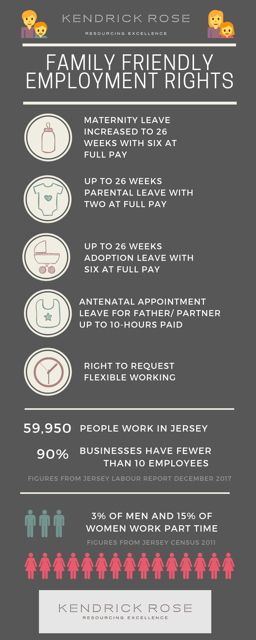Businesses with fewer than 10 employees make up 90% of undertakings in Jersey according to Labour Market figures from December 2017. Despite having six months to prepare for the changes, which also allow employees to request flexible working, Shelley Kendrick, Managing Director of Kendrick Rose, fears some of them might not be entirely ready.
She said: “While larger firms have the time and resources to ensure they’re ready to comply with the new legislation, smaller businesses may still struggle. Everybody want to support the family-friendly policies, but smaller businesses are not necessarily prepared for the costs and the staffing implications. It will take time for everyone to work out how to deal with the laws and embed them into working life in the Island.
“There is a lot of information out there to help smaller businesses and many of the law firms offer free seminars that can help employers work out the details. We are also seeing a growth in HR consultants who work with small businesses to help deal with more complex issues and guide them through periods of change like this.”

Pictured: The recruiters say smaller businesses may not have the resources to cope with the changes.
Recruitment firms such as Kendrick Rose anticipate an increase in candidates seeking part time work as a result of the new legislation. Ms Kendrick however says it could take time before candidates become fully aware of the Employment (Amendment of Law) (No.2) Jersey Regulations.
She added: “Jersey is behind many parts of the world for flexible work, partly because we have a lot of SMEs (Small and Medium-sized Enterprises) who need the head count to function. Job sharing can solve this problem, however, for some businesses the cost of employing someone part time is nearly the same as employing someone full time because benefits such as health insurance are a fixed cost.
“The legislation will possibly speed up the rise of part time work as companies recognise they can cope with people working fewer hours through improved efficiency, for example, with book keeping or accounts. Employers also recognise that younger generations want to work more from home or remotely to fit their lifestyles and appreciate more flexibility.”


Comments
Comments on this story express the views of the commentator only, not Bailiwick Publishing. We are unable to guarantee the accuracy of any of those comments.